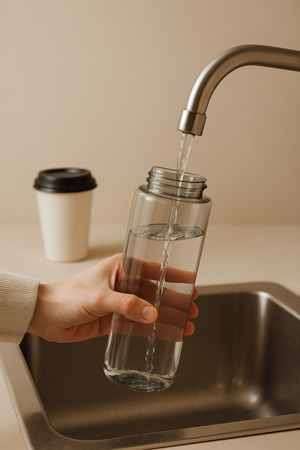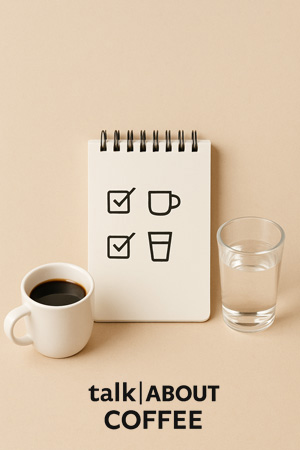If you’ve been drinking coffee for any length of time, you’ve probab...

If you’ve been drinking coffee for any length of time, you’ve probably heard someone tell you that coffee dehydrates you. Maybe it was your doctor, your fitness-conscious friend, or that coworker who drinks nothing but water and judges everyone else’s beverage choices. The advice usually goes something like this: “For every cup of coffee you drink, you need to drink an extra glass of water to make up for it.”
My own doctor mentioned this to me once, and I just nodded because who argues with their doctor about coffee?
Makes sense, right? Caffeine makes you pee more. That’s just basic biology. And if you’re peeing more, you must be losing more water than you’re taking in. Case closed.
Except here’s the thing: Like a lot of coffee ‘facts’ people throw around, this one falls apart when you actually look at the research.
What the Science Actually Says
Let’s start with what we know for sure. Yes, caffeine is a mild diuretic. When you drink coffee, you’ll probably find yourself making more trips to the bathroom than you would if you’d had the same amount of water. But here’s the thing that the “coffee dehydrates you” crowd seems to miss: coffee is still mostly water.
A typical 8-ounce cup of coffee contains about 95 milligrams of caffeine and roughly 7.5 ounces of water. Even if the caffeine makes you lose a little extra water through urination, you’re still getting a net gain in fluid intake. It’s like saying that swimming in the ocean makes you wet, but then arguing that the salt somehow cancels out all the water.

Several studies have put this myth to the test. In 2014, researchers at the University of Birmingham studied men who regularly drank coffee and had them drink either four cups of coffee or four cups of water daily for three days. They measured everything you’d want to measure when looking at hydration: blood samples, urine samples, body weight, and more.
The result? No significant difference in hydration levels between the coffee days and the water days. The coffee drinkers were just as hydrated as the water drinkers.
Why the Myth Persists
So if the science is pretty clear that coffee doesn’t dehydrate you, why does this myth hang around like a bad smell?
Part of it comes from older research that looked at caffeine in isolation, rather than coffee as a whole beverage. When researchers gave people caffeine pills, they did see increased urination. But that research didn’t account for all the water that comes along with your morning cup of joe.
There’s also the fact that if you’re not used to caffeine, it can have a stronger diuretic effect. People who don’t regularly drink coffee might notice they need to pee more after having a cup, and they assume this means they’re getting dehydrated. But regular coffee drinkers develop a tolerance to caffeine’s diuretic effects pretty quickly, usually within a few days.
Another factor is that some people mistake the symptoms of caffeine withdrawal for dehydration. If you’re used to drinking coffee every day and then skip it, you might get a headache and feel sluggish. These symptoms overlap with mild dehydration, so it’s easy to think that your usual coffee habit was somehow causing dehydration when the opposite is true.
The Real Story on Coffee and Hydration

Here’s what actually happens when you drink coffee. The water in your cup contributes to your daily fluid intake, just like any other beverage would. The caffeine does make you urinate a bit more than you would with plain water, but not enough to offset the fluid you’re taking in.
Think of it this way: if coffee actually dehydrated you, wouldn’t regular coffee drinkers be walking around in a constant state of dehydration? Countries like Finland, where people drink an average of four cups of coffee per day, would have serious public health problems. Instead, Finns seem to be doing just fine.
The Mayo Clinic, which is usually pretty conservative about these things, includes coffee in their list of fluids that count toward your daily hydration needs. They note that while caffeinated beverages can have a mild diuretic effect, they still contribute to overall fluid intake.
What About Those Bathroom Breaks?
If coffee doesn’t dehydrate you, why does it seem to send you to the bathroom so often? There are a few reasons for this.
First, you’re drinking a fairly large volume of liquid, often first thing in the morning when your bladder might already be getting full from the night before. Second, coffee can stimulate your digestive system, which can create pressure that makes you feel like you need to urinate even if your bladder isn’t completely full.

Finally, there’s the ritual aspect. Many people drink their coffee at the same time each day, often while reading or settling in at work. This routine can create a psychological association between coffee time and bathroom time.
The Bottom Line
Coffee does not dehydrate you. While caffeine has mild diuretic properties, the amount of water in coffee more than makes up for any extra fluid loss. If you’re a regular coffee drinker, your body has adapted to caffeine’s effects, and your coffee habit is actually contributing to your daily hydration.
Does this mean you should replace all your water intake with coffee? Probably not. Coffee has calories if you add milk and sugar, and too much caffeine can cause jitters, sleep problems, and other issues. But you don’t need to panic about dehydration every time you reach for a cup.
If you enjoy coffee and it makes you feel good, drink it. Your kidneys, your bladder, and your hydration levels will be just fine. And the next time someone tells you that coffee dehydrates you, you can politely let them know that the science says otherwise.
Just don’t expect them to believe you right away. Some myths die hard, even when the evidence is crystal clear.
Some posts on our site may contain amazon affiliate links. We may earn affiliate commission from amazon when you purchase through those links.
Leave a Reply